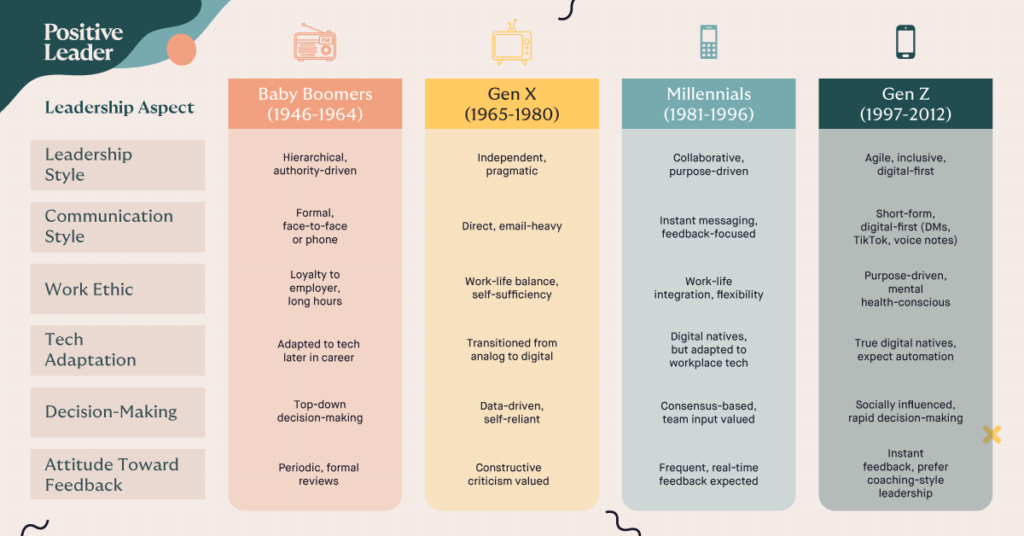Millennial Leadership Style: Balancing Purpose, Collaboration, and Growth

What do Mark Zuckerberg, Prince William, and the Olsen Twins all have in common? They’re all technically millennial leaders.
Born between the years of 1981 and 1996, what makes millennials so interesting from a leadership standpoint is that they were raised straddling the line between the analog and digital world.
They went from payphones to smartphones. They were the first generation to start using computer tech in their leisure time and not just work. They remember (fondly, even!) what it was like to rent movies from Blockbuster but now spend their weekends binge watching those same movies on Netflix. And, when it comes to how they work, millennials are especially adept at adapting to what’s next: After all, they’ve been pivoting their whole lives.
Millennials lead with a style defined by clear communication, collaboration, and empathy.
It’s perfect timing, since you can bet the next wave of new leaders will be made up of millennials. According to the U.S. Department of Labor, Millennials make up 36 percent of the American workforce, which is more than any other generation. So, whether they’re leading massive corporations, fashion brands, small nonprofits, or entire countries, millennials are the next big thing in leadership. It’s time we get to know their management style a little better.

5 Traits of Millennial Leaders
You might be surprised to find out just what went into influencing the way millennials are leading the charge toward healthier, more engaging, and empathetic workplaces. We’ll delve deeper into what makes millennial leaders tick and how they’re bringing their unique influence to the way we do business.
1. They Love Collaboration
Millennials might be one of the most connected generations ever. They’re comfortable talking face-to-face like Gen X, but they’re also adept at using technology to communicate with their Gen Z employees. They’ve been on social media for 10-20 years and, because they’re so well-connected with people they know in real life as well as those in their industries, their “algorithms” aren’t as curated as younger generations.
They know how important it is to hear different viewpoints and consider all sides. When it comes to making a decision or problem-solving, millennial leaders prefer to crowdsource and collaborate with their colleagues to come up with the best solution, even if it’s not their own.
2. They Search for Clarity and Promote Transparency
Like Gen X, millennials also grew up as “latchkey kids,” due to their parents working outside of the home. But, while that taught Gen X to be creative to fill their time, millennials were coming home to an empty house with an internet connection. Millennial teens were the first generation to have reliable web access and all that comes with it. They’re used to figuring things out for themselves and always having answers at their fingertips.
It only makes sense, then, that millennials prize a work environment that promotes clarity and transparency for all. They won’t simply take someone’s word for it; they’ll need to know for themselves. As leaders they offer those same opportunities to their employees by ensuring policies, protocol, and communication is open and available.
3. They Encourage Healthy Work-Life Balance
Chances are a millennial’s first manager was a baby boomer—known for hard work but often keeping business and personal matters separate. Millennials remember feeling like just another cog in the corporate machine, burned out by high pressure and little personal connection. They didn’t like it.
Work-life balance is central to their leadership style. They see employees as people, not assets. A Deloitte survey found 46% of millennials consider work part of their identity—after family and friends. While committed to their roles, they prioritize balance, leading by example and encouraging it in their teams.
4. They’re Emotionally Intelligent
One of things we love most about millennial managers is how they’re more likely than previous generations to lead with empathy and understanding. Their emotional intelligence creates an entirely new workplace culture when it’s utilized as a tool for breaking through strict hierarchies and opening up lines of honest and candid communication. Millennials are comfortable with questioning themselves and checking in with their emotions as part of being a self-aware, empathetic leader.
5. They Ask for Feedback and Welcome Pushback
Raised during a technological revolution, millennial leaders rarely do things just because “that’s how it’s always been done.” They naturally question processes—How does this work? Why are we doing it this way? What’s stopping us from improving?—and invite their teams to do the same. Pushback isn’t a problem if it leads to better solutions.
This openness to feedback also makes them strong communicators. In fact, a LiveCareer survey found millennials were the only generation to rank communication as their top skill. They get to the heart of issues quickly and compassionately, whether in person, over the phone, or via email.
Evaluating Millennial Leadership Style
Of course, when you were born doesn’t always tell you what kind of leader you’ll be. Still, millennials experienced a specific type of upbringing that put them in the perfect position to disrupt the prevailing leadership culture in a truly meaningful way. As products of stricter parents, harsher managers, and “business as usual,” they’re willing to lead with empathy and sensitivity and open up the floor to others’ opinions. Their quest for clarity and ability to connect changed the way we do business, and we’re better for it.
Not sure what type of manager you are? Use our Positive Leader Assessment Tool and we’ll help you identify your leadership strengths—no matter what generation you’re a part of.
Article Contributor: Dave Corker
